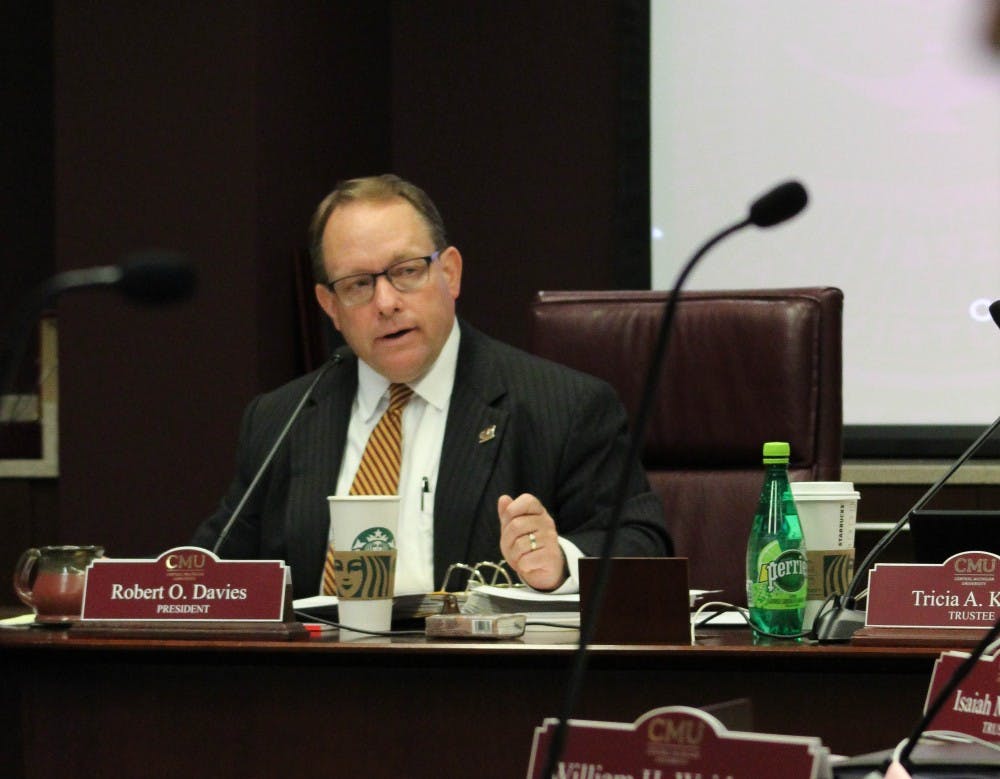President Davies introduces fund for innovation and excellence at Board of Trustees meeting

President Bob Davies stresses the importance of excellence and innovation during the President's Report at the Board of Trustees meeting June 27 in the President's Conference Room.
To further his goals of rigor, relevance and excellence for Central Michigan University, President Bob Davies established a fund dedicated to promoting innovation on campus.
Davies discussed innovation and strategic planning at the Board of Trustees meeting June 27 in the President's Conference Room in Bovee University Center.
The $3 million President's and Provost's fund will award grants on a competitive basis to students and faculty who present innovative, creative and interdisciplinary ideas.
"It’s the university making a statement that we are going to prioritize excellence and we're going to prioritize innovation," he said. " This is an overt call to the campus to really put some ideas down and create a sense of collaboration and partnerships."
He and Provost Mary Schutten, who begins her tenure July 1, are establishing guidelines for the fund. They will be ready to accept proposals by mid-August.
"This provides the opportunity – the extra funds – to really be creative. (And) to be forward-thinking, to engage our faculty in a meaningful way that will produce activities and programs that will really put CMU on the map," Davies said.
During his report to the board, Davies also explained he will review the university's strategic plan that was adopted in 2017. The three pillars of the plan include nurturing student success, fostering scholarly activity and strengthening partnerships in Michigan and beyond.
"With any strategic plan, you need to revisit it, look at it, take it off the shelf and dust it off. (You should) look at what has changed in the environment, what has changed with us internally, and make adjustments," he said.
Davies wants to keep the pillars, but he also wants to address four issues that affect not only CMU, but organizations across the world:
- Rapid changes in technology and communication
- Advancement in biomedicine and health professions
- Sustainability, not only climate, but also cultural and economic
- Globalization
"We need to look at how we impact those, how those (issues) impact us," Davies said. "How do we impact that through our scholarship and creative activities, through our teaching and preparing our students to deal with those issues?"
Vice President of Finance and Administrative Services Barrie Wilkes presented the 2019-20 operating budget to the board. With a decline in enrollment came a decrease in revenue, so Wilkes said some reductions were made. The university asked staff to plan for a 5 percent budget reduction, and the actual reduction was 3.8 percent.
There were some reductions, but the budget priorities committee also suggested some areas that should receive additional investment. Those areas included the President's and Provost's fund for innovation and excellence, recruitment, marketing and academic advising.
Currently, 53 percent of revenue comes from tuition, 15 percent comes from residence halls and auxiliary services and 19 percent comes from state appropriations. Wilkes said he would like to see CMU diversify its revenue sources, so it doesn't have to rely as heavily on tuition dollars.
The final budget is projected to total $461,836,586. This is an $18 million decrease from last year's budget.
"In some ways I think, a strong argument could be made that this budget is actually better," Trustee Richard Studley said. "A little belt-tightening is not bad. It causes you to focus on what is really important."
During the public comment portion of the meeting, four representatives from El-Hajj Malik El-Shabazz Academy addressed trustees. The Gov. John Engler Center for Charter Schools recently informed the academy that it would not renew its charter, due to poor academic performance over the past five years.
Trustees approved a motion to reconstitute the academy's board of directors and, at the request of the academy, reduce the board from seven representatives to five. Chair Tricia Keith explained the board requested the change because it was often unable to convene a quorum. Following trustees' action, the charter school board can move forward with the dissolution of the school.
The Midland Academy of Advanced and Creative Studies, which is chartered by CMU, will be closing this year as well.



